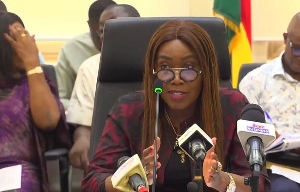- Home - News
- TWI News | TV
- Polls
- Year In Review
- News Archive
- Crime & Punishment
- Politics
- Regional
- Editorial
- Health
- Ghanaians Abroad
- Tabloid
- Africa
- Religion
- Election 2020
- Coronavirus
- News Videos | TV
- Photo Archives
- News Headlines
- Press Release
Business News of Monday, 7 November 2016
Source: B&FT
Investors may turn away from Komenda Sugar factory
The Member of Parliament for Effutu, Alexander Afenyo Markin, has disclosed that government’s decision to contract professional consulting firm PricewaterhouseCoopers Ghana Limited (PwC) to search for prospective investors for the Komenda Sugar factory may turn in prove difficult due to the lack of raw materials.
The factory has been shut down since July this year for want of raw material – sugarcane.
According to the MP for Effutu: "…you have now gone to PricewaterhouseCoopers to seek private participation in this project; even that in itself is defective because there is no assured source of raw materials, so how do you expect any genuine investor or reasonable businessman to invest in it, because the factory is not operating"
In taking an investment decision, a reasonable businessman may look at the source of raw materials and a reliable source is key, they would not want to complete a factory and allow it to sit without any operation. A reasonable businessman will not want to incur cost when there is no production," he said.
Mr Afenyo, who is also a member of the Finance Committee, commended government for the initiative to support sugar cane outgrowers to support the factory with sugar, however he raised concerns with the timing.
"We went to the Indians to support us to revamp the sugar factory; we took a facility of US$35million but we forgot that after constructing the factory we will need raw materials to feed the factory.
It is a matter of public record that the factory has the capacity to give direct employment to over 7,500 Ghanaians, but that has not been done, because there is no sugarcane to feed the factory"
His comments came up during Parliament’s approval of a US$24,540,000.000 Indian loan facility for the Komenda Sugar Factory.
Deputy Trade Minister, Murtala Mohammed, further explained that the indigenes living around the factory are already engaged in sugar cane production but rather government’s focus is to have an "unabated and continuous supply of sugar such that the factory as it begins production of sugar they can have it without difficulty, so it isn’t that we don’t have sugarcane".
The loan facility which was sourced by the Government of Ghana from the Exim Bank of India is to be used to finance the development of an irrigation system, and to facilitate the cultivation of sugarcane to feed the Komenda Sugar Factory.
The company, therefore, is expected to use part of the money to develop a sugarcane plantation and also extend support to the farmers or outgrowers, to help produce sufficient sugarcane as raw material to feed the factory.
Overall, total land acreage of 2000 of the factory’s own land is expected to be cultivated to produce more than 100,000 tons of sugarcane per annum and thousands of additional acreage of out grower plantations assisted.
Irrigation schemes are also expected to be developed under the project to serve the nucleus farms of the Komenda Sugar Factory and adjoining communities.
Ghana currently imports substantial quantities of sugar for both domestic consumption and industrial use.
In 2013, sugar remained the eight most valuable imported commodity and the fourth largest food import after rice, fish and poultry.
Sugar consumption is growing rapidly and in recent years, Ghana has spent more than US$200million per annum on importing about 200,000 metric tons of sugar.











